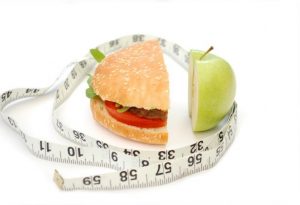Rules For Selecting A Healthy Diet
Author: Dr. Stephen Chaney
 Recently, someone asked my opinion of the Whole 30 Diet. When you look at their web site, the claims are impressive:
Recently, someone asked my opinion of the Whole 30 Diet. When you look at their web site, the claims are impressive:
- Blood sugar swings disappear, energy levels improve, digestive issues and inflammation disappear.
- Lose weight without counting calories.
- Eliminate a long list of lifestyle-related diseases.
You probably want to know whether these claims are true. I do not have time to evaluate every diet, so let me evaluate the Whole 30 Diet in terms of principles you can use to evaluate any of the diets you will encounter in the new year.
What Is The Whole 30 Diet?
Basically, the Whole 30 Diet is a 30-day elimination diet designed to help you lose weight rapidly and change the way you eat.
 The diet allows you to eat “moderate portions of meat, seafood, and eggs; lots of vegetables; some fruit; plenty of natural fats; and herbs, spices, and seasonings.” [You are instructed to] “eat foods with very few ingredients, all pronounceable ingredients, or better yet, no ingredients listed at all because they’re whole and unprocessed.”
The diet allows you to eat “moderate portions of meat, seafood, and eggs; lots of vegetables; some fruit; plenty of natural fats; and herbs, spices, and seasonings.” [You are instructed to] “eat foods with very few ingredients, all pronounceable ingredients, or better yet, no ingredients listed at all because they’re whole and unprocessed.”
- Recommended meats are grass-fed beef, organic poultry, and wild-caught fish.
- Recommended fats are coconut oil, olive oil, and ghee (clarified butter).
The diet forbids:
- Added sugar, real or artificial, in any form.
- Alcohol
- Grains
- Legumes
- Dairy
- The additives carrageenan, MSG, and sulfite.
- Baked foods, junk foods, and treats (sweets).
Although, not explicitly stated, because this diet eliminates sugar, grains, legumes, and baked goods, it is essentially a low carb diet.
This diet prescription is absolute. According to the authors of the diet: “Just a small amount of any of these [forbidden] inflammatory foods could break the healing cycle; promoting cravings, messing with blood sugar, disrupting the integrity of your digestive tract, and (most important) firing up the immune system. One bite of pizza, one spoonful of ice cream, one lick of the spoon mixing the batter within the 30-day period and you’ve broken the “reset” button, requiring you to start over again on Day 1.”
My comment: This statement is not accurate, but I understand why they say it. They are simply trying to get you to adhere strictly to the diet. After all, it is the little “modifications” we make that doom most diets to failure. It’s when we say: “Surely, one ice cream sundae can’t hurt” or “I don’t have time to fix dinner. I’ll just pick up some fried chicken on the way home.”
Finally, the Whole 30 Diet:
- Tells you not to count calories and not to step on the scale for 30 days. I consider this a plus. Successful diets should emphasize lifestyle change, not counting calories.
- Says nothing about exercise. This is a glaring omission.
Does The Whole 30 Diet Uphold The Rules For Selecting A Healthy Diet
Here are my rules for evaluating healthy diets:
First, let’s look at the initial (short-term) weight loss:
 Any diet that eliminates sodas, junk foods, fast foods, and sweets will make you healthier and will help you lose weight. This is a big plus for the Whole 30 Diet.
Any diet that eliminates sodas, junk foods, fast foods, and sweets will make you healthier and will help you lose weight. This is a big plus for the Whole 30 Diet.- Any diet that emphasizes whole foods over processed foods is likely to help you lose weight. This is also a plus for the Whole 30 Diet.
- Both low carb and low-fat diets can help you lose weight. Let me be clear. I am talking about plant-based low-fat diets, not low-fat diets with a lot of sugars and simple carbohydrates. Low carb diets also result in water loss. This is also a plus for the Whole 30 Diet.
- Diets that eliminate whole food groups tend to result in short-term weight loss. That’s because they eliminate some of your favorite foods, and it generally takes you a while to adjust. Since the Whole 30 Diet is focusing on the first 30 days, this is also likely to be a plus for the Whole 30 Diet.
- Exercise is an essential component of healthy weight loss diets. The lack of a defined exercise component is a minus for the Whole 30 Diet.
- On balance, the Whole 30 Diet is likely to be effective for short-term weight loss. However, this is true for most popular diets because they also eliminate sodas, junk foods, fast foods, and sweets. I have heard of the “Meat Lovers Diet” (which I don’t recommend), but I have never heard of a “Junk Food Lovers Diet.” Many of the popular diets also favor whole foods and eliminate multiple food groups.
- The main difference between the Whole 30 Diet and other popular diets is their absolute prohibition of any deviation from their diet plan. This makes the diet harder to follow, but it increases the probability of weight loss for those who do follow the plan.
- Weight loss improves blood sugar control, energy levels, and inflammation. Thus, those claims are likely to be true, but not entirely for the reasons the diet proponents claim. The diet’s effect on digestive issues are likely to vary from one individual to another. However, if you have digestive issues to begin with, you probably have a problem with one or more of the foods you are currently eating. The elimination of multiple foods from your diet may help.
- Weight loss can also reduce the severity of diabetes and other lifestyle diseases. This claim may also be true, but not for the reasons the diet proponents claim.
Next let’s look at long term weight loss. Here the Whole 30 Diet doesn’t look as promising. The Whole 30 Diet has only been around since 2009, so we have no long-term data comparing weight maintenance with other diets. However, here is what we do know.
 Consumption of sodas, junk foods, fast foods, and sweets is associated with weight gain. Elimination of these foods is a plus for the Whole 30 Diet.
Consumption of sodas, junk foods, fast foods, and sweets is associated with weight gain. Elimination of these foods is a plus for the Whole 30 Diet.- The emphasis on whole foods rather than processed foods is also a plus because it is teaching healthier eating habits that are compatible with long-term weight maintenance. In contrast, I do not recommend most diets offering pre-packaged foods. If you are eating low calorie pizzas and brownies, you aren’t learning healthy eating habits.
- However, plant-based diets are better at preventing weight gain long-term than meat-based diets. As I pointed out in a recent article in “Health Tips From the Professor”, vegans and people who consume primarily vegetarian diets weigh less than their meat-eating counterparts. The reliance on meats rather than legumes and other plant foods as the predominant protein source is a minus for the Whole 30 Diet.
- A recent study showed that people consuming a meat-based low carb diet gained just as much weight over a 20-year period as people consuming a low-fat diet with lots of sugar and refined carbs. In contrast, people consuming a plant-based low carb diet gained significantly less weight over the same 20-year period. Again, this is a minus for the Whole 30 Diet.
Finally, let’s look at long term health. The information on the Whole 30 Diet’s web site does not make it clear what kind of diet they are recommending once you have completed your 30 days. However, if they are recommending a similar diet long-term, there are no long-term data showing it is healthy. The data we do have on that type of diet is mixed.
 Consumption of sodas, junk foods, and fast foods is associated with an increased risk of diabetes and heart disease. Thus, elimination of these foods is a plus for the Whole 30 Diet, as is the reliance on whole, unprocessed foods.
Consumption of sodas, junk foods, and fast foods is associated with an increased risk of diabetes and heart disease. Thus, elimination of these foods is a plus for the Whole 30 Diet, as is the reliance on whole, unprocessed foods.- However, multiple studies have shown that primarily plant-based diets are associated with significantly lower long-term risk of heart disease, diabetes, and other lifestyle diseases than meat-based diets. I have covered these studies in several recent issues of “Health Tips From the Professor.” This is a minus for the Whole 30 Diet.
- Diets that eliminate whole food groups are likely to result in nutritional deficiencies. For example, the Whole 30 Diet is similar to the paleo diet, and a recent study showed the paleo diet results in multiple nutritional deficiencies. This is also likely to be a minus for the Whole 30 Diet.
Other Comments:
- All added sugar is not bad for you. I agree that added sugar in sodas, junk foods, fast foods, and sweets should be avoided. However, for other foods the glycemic index is more important than whether the food contains added sugar. I covered this topic in detail in a recent article called “Is It The Sugar, Or Is It the Food?”
- Red meat is considered a probable carcinogen. There is no evidence that grass-fed beef is any healthier with respect to cancer risk than conventionally raised meat. I covered this in detail in my recent article on the paleo diet.
- Olive oil has been shown to be healthy in multiple studies. However, both coconut oil and ghee contain ~50% long-chain saturated fats and are problematic. I have covered this in detail in a previous article on coconut oil.
- Whole grains and legumes are included in most anti-inflammation diets. Their exclusion from the Whole 30 Diet cannot be justified on the basis of inflammation.
- I would be far more concerned about additives like artificial colors, flavors and preservatives than I would be about carrageenan, MSG, and sulfite. I have covered carrageenan in one recent article and MSG in a second article.
Is The Whole 30 Diet Right For You?
In summary, there is a lot to like about the Whole 30 Diet:
- It eliminates sodas, junk foods, fast foods, and sweets.
- It focuses on whole foods rather than processed foods.
- If followed exactly as described for 30 days, it is likely to result in successful short-term weight loss.
- The weight loss is likely to be associated with health benefits.
- However, these statements are equally true for most popular diets.
The web site for the Whole 30 Diet does not indicate what diet is recommended at the end of the 30-day period. However, if the Whole 30 Diet is continued, it is not clear whether it would be ideal for weight maintenance and health long-term.
- The elimination of sodas, junk foods, fast foods, and the reliance on whole foods is a positive.
- It’s reliance on meat rather than legumes and other plant protein sources is a negative.
- It’s elimination of multiple food groups is likely to lead to nutritional deficiencies.
The Bottom Line
If you are primarily interested in an evaluation of the Whole 30 Diet, here is a summary:
There is a lot to like about the Whole 30 Diet:
- It eliminates sodas, junk foods, fast foods, and sweets.
- It focuses on whole foods rather than processed foods.
- If followed exactly as described for 30 days, it is likely to result in successful short-term weight loss.
- The weight loss is likely to be associated with health benefits.
- However, these statements are equally true for most popular diets.
The web site for the Whole 30 Diet does not indicate what diet is recommended at the end of the 30-day period. However, if the Whole 30 Diet is continued, it is not at all clear whether it is ideal for weight maintenance and health long-term.
- The elimination of sodas, junk foods, fast foods, and the reliance on whole foods is a positive.
- It’s reliance on meat rather than legumes and other plant protein sources is a negative.
- It’s elimination of multiple food groups is likely to lead to nutritional deficiencies.
If you would like to know the principles used to reach these conclusions (principles you can use to evaluate any diet), read the article above.
These statements have not been evaluated by the Food and Drug Administration. This information is not intended to diagnose, treat, cure or prevent any disease.
